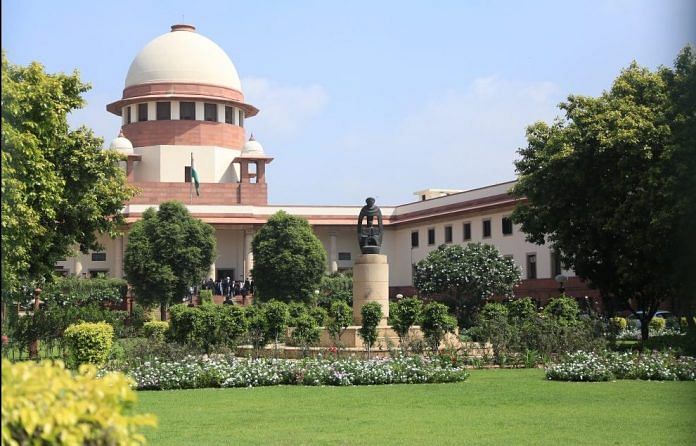New Delhi: The Internet Freedom Foundation (IFF) has proposed to launch a ‘zombie tracker’, which will list the instances when Section 66A of the Information Technology Act — struck down by the Supreme Court in March 2015 — has been used to curb dissent across the country.
The privately-run watchdog had last year released a research paper, which showed that cases were still being filed under Section 66A of the IT Act.
Its new tracker, to be made in partnership with CivicData Labs, will check if any fresh Section 66A cases are being registered on a monthly basis. The tracker will analyse and publish large data sets that will be publicly accessible for scrutiny and civic awareness.
The IFF proposes to target high courts and district courts of 14 states, which will potentially include Assam, Bihar, Delhi, Gujarat, Jharkhand, Karnataka, Kerala, Madhya Pradesh, Maharashtra, Odisha, Punjab, Rajasthan, Telangana, West Bengal, with possible additions based on logistics.
The organisation has already built a prototype of a digital dashboard from court data in Maharashtra and is currently looking for funding, having submitted a detailed proposal for the Agami ‘Data for Justice’ challenge.
The data will eventually be used to file an application in the Supreme Court to bring greater attention to the “signal failure” between court judgments and enforcement through policing and the lower judiciary.
Also read: NCW is reviewing cyber crime laws, says existing IT Act doesn’t adequately help women
‘What happens to the average Ashok Kumar?’
“Most people know that the problem in India is not the judgments but implementation,” IFF co-founder Apar Gupta told ThePrint while explaining the idea behind the project.
He added that technology “can actually be used in a positive way to further not only the rule of law framework but in its most appropriate setting, which is to protect the freedom of speech and expression”.
The tracker, he said, will also account for cases that do not fall under the public radar. “People these days only talk about the Priyanka Sharma case or the Prashant Kanojia case but we don’t know what happens beyond these very well-publicised incidents,” Gupta said. “What happens to the average Ashok Kumar?”
According to Joanne D’Cunha, associate counsel at IFF, this is just the start. “The idea is to be able to be specific in identifying exactly where we’re going wrong to fix that problem,” she said. “After we’ve looked at Section 66A, we also want to be able to track other provisions that have been declared unconstitutional, and use the same logic there.
“The idea is that instead of just berating people for not adhering to these things, we’re trying to be more actionable and identify where the gap is,” she added. “That is the main intention of the zombie tracker.”
Arbitrary, excessive and disproportionate
Section 66A was inserted into the IT Act through an amendment in 2008 to criminalise sending “offensive messages” online. It, however, was behind the arrests of young college students, a cartoonist and several social media users for their social media activity.
It was declared unconstitutional in March 2015 in the celebrated Shreya Singhal v Union of India judgment by a bench comprising Justice J. Chelameswar and Justice R.F. Nariman.
The court had then ruled that the legal provision “arbitrarily, excessively and disproportionately” invaded the right of free speech, violating Article 19(1)(a) of the Constitution of India.
Also read: Supreme Court judge Deepak Gupta slams ‘misused’ sedition law, says it’s time for re-look
The ‘zombie provision’
The IFF paper released in November last year showed, however, that Section 66A was still being used across India — by police personnel, trial courts and even high courts.
The paper, relying on legal databases, said that in over nine months last year, there were at least 45 such cases. It also cited media reports which claimed that people were still being charged under Section 66A.
The paper reasoned that a “signal failure” between different branches of the government led to Section 66A still being used.
The paper highlighted the fact that the main source of data — registration of crimes through first information reports (FIRs) in police stations — remains wholly outside the scope of these databases.
Apart from this, the National Crime Records Bureau (NCRB) data for 2015 and 2016 also showed that widespread arrests continued despite the SC judgment. The NCRB, however, issued a “corrigenda” in 2016 clarifying that those numbers were incorrect due to an error in the internal data processing system. It further said that it will not publish data on Section 66A in subsequent reports.
Apex court’s intervention
Citing the IFF research, the Peoples’ Union for Civil Liberties (PUCL) had filed an application before the Supreme Court demanding that the continued use of the provision be stopped.
Disposing of the petition in February, the apex court then directed the central government to send copies of the Shreya Singhal judgment to the central secretaries of all state governments and union territories.
It expected the chief secretaries to sensitise the police departments by sending copies of the judgment to the director general of police in each state. It also ordered all high courts to send the judgment to the district courts.
Also read: Twice in a week, India moves to clamp down free speech



